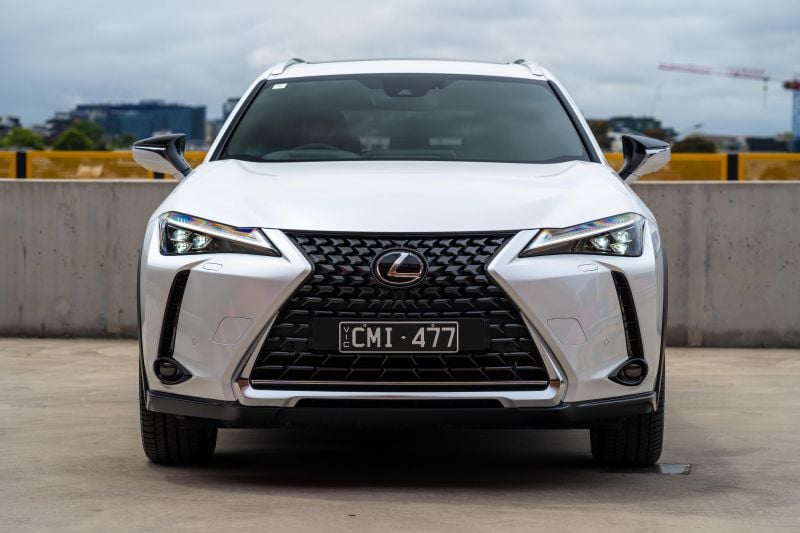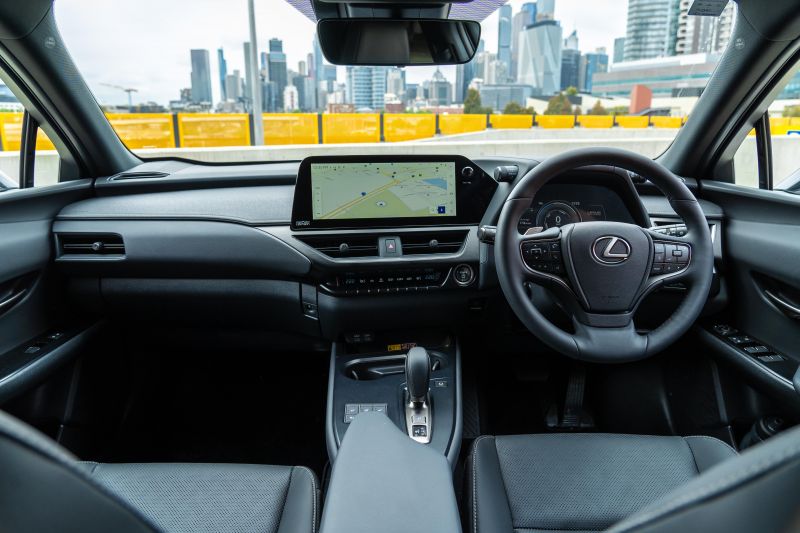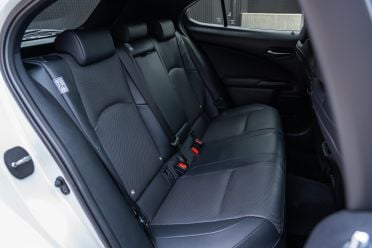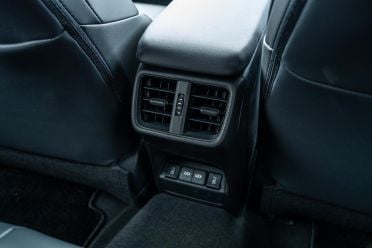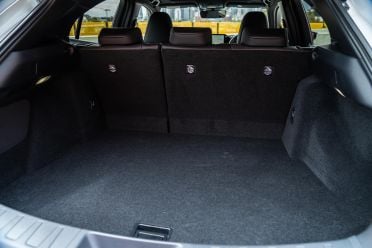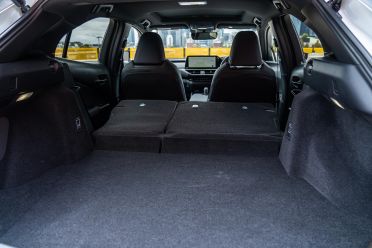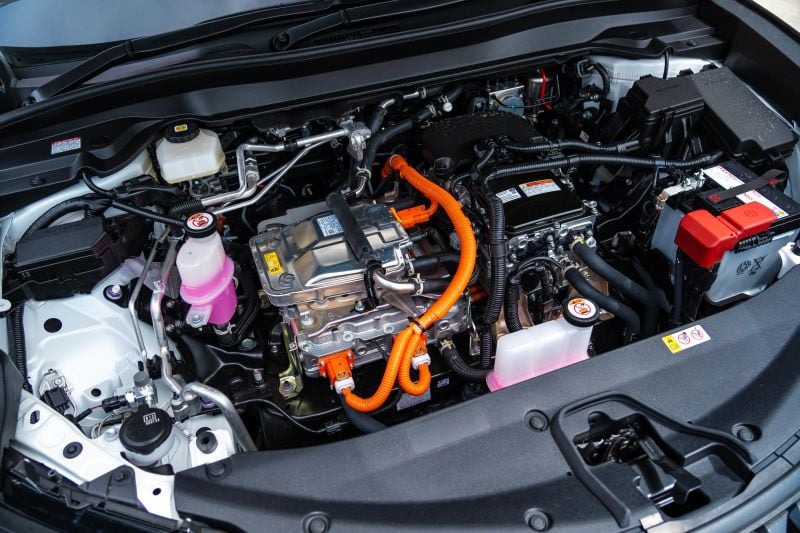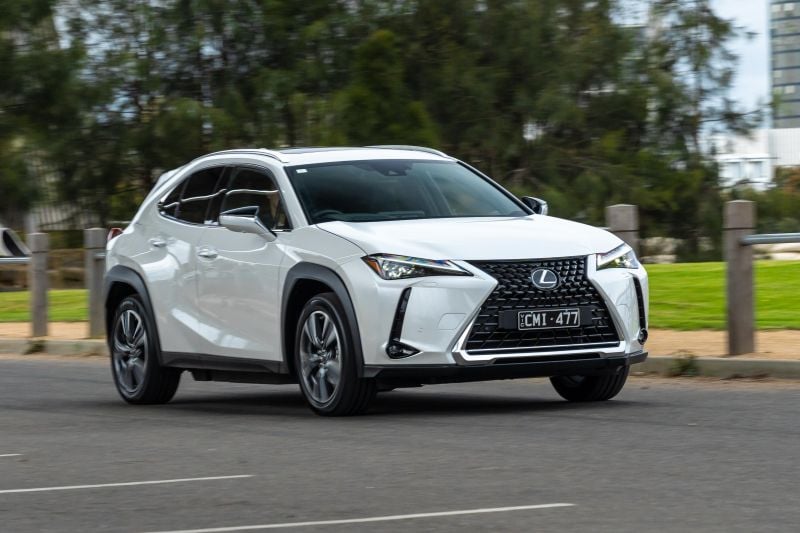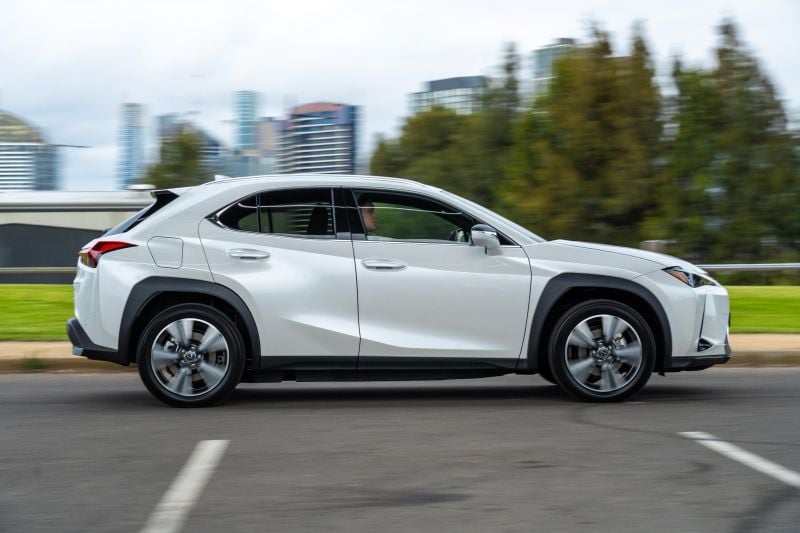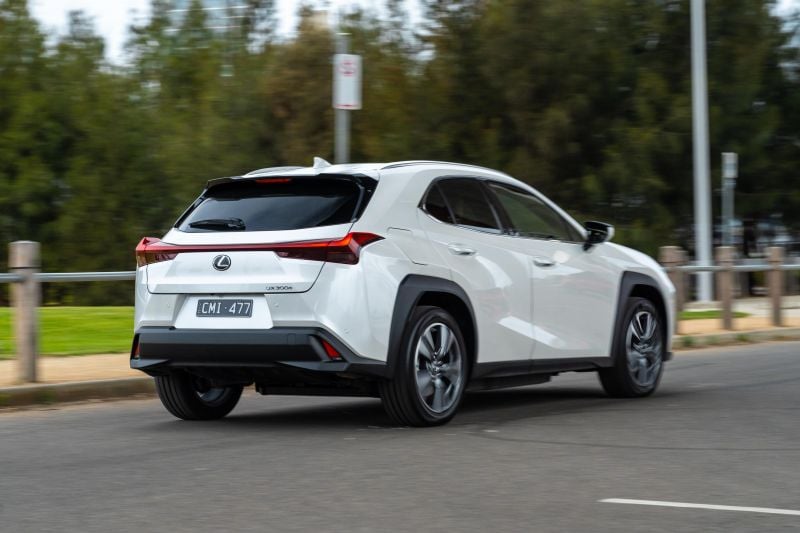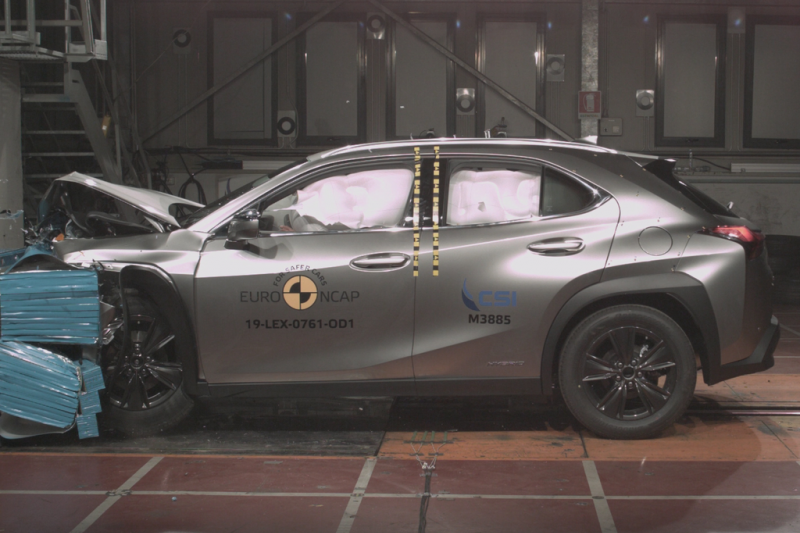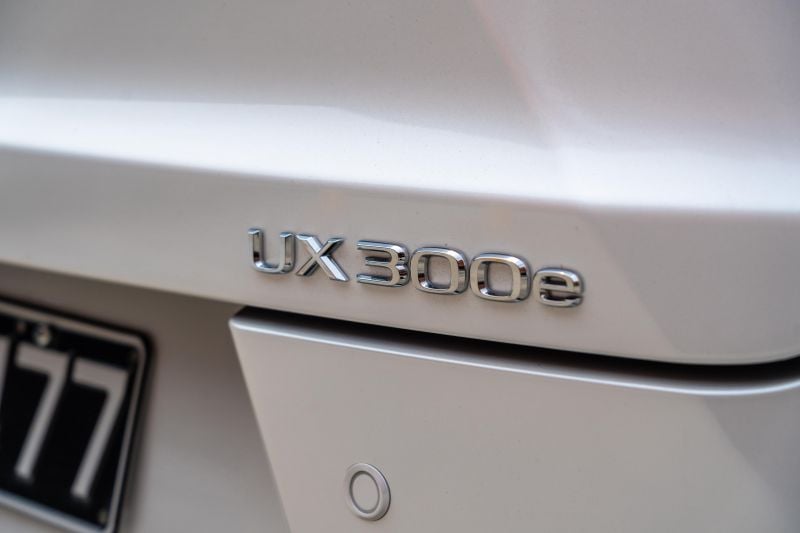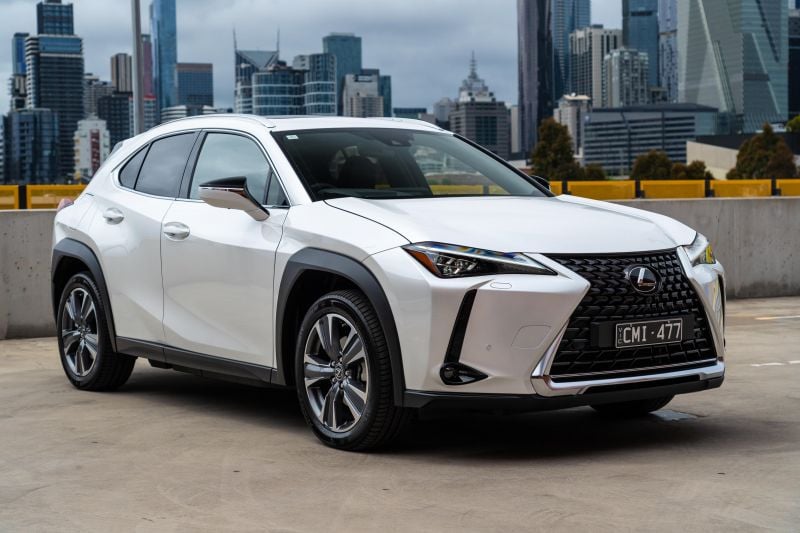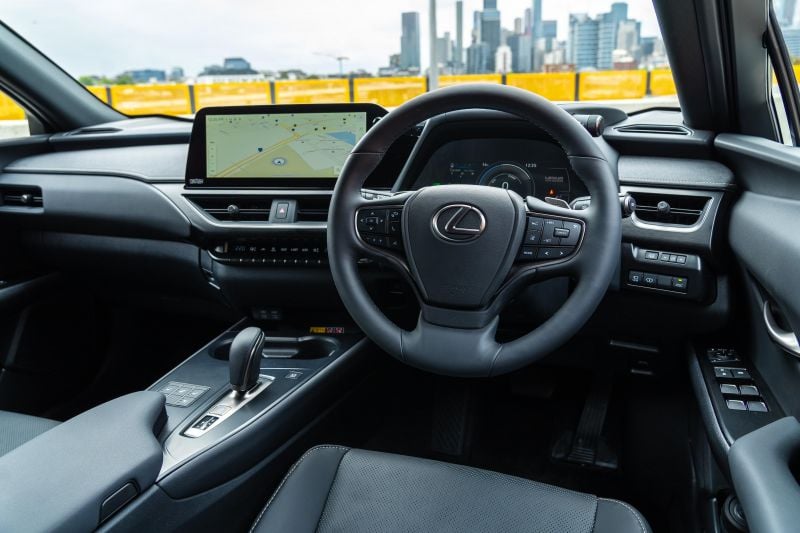Lexus has given its first electric car in Australia, the UX300e, a significant overhaul.
Rather than a normal nip-and-tuck, it’s fitted a new battery pack that helps extend the claimed range by more than 100km in a bid to make the UX more competitive with the growing crowd of electric SUVs duking it out around the $80,000 mark.
Along with the bigger new battery, the updated UX electric car features an improved touchscreen and smarter tech for the driver, a reinforced chassis, and revised tuning for the electric power steering, shock absorbers and brakes.
As you’d expect, pricing has also been hiked. Has Lexus done enough with its latest update to make the little UX 300e relevant?
How does the Lexus UX fare vs its competitors?
View a detailed breakdown of the Lexus UX against similarly sized vehicles.

Lexus
UX
How much does the Lexus UX 300e cost?
Prices are up on the electric UX 300e and by just shy of $8000 for the dearer model; although, both models just manage to sneak below the all-important threshold for the FBT exemption that makes it cheaper to take out a novated lease on an electric car.
The base UX 300e Luxury is around $13,000 more expensive than the priciest UX Hybrid, and goes head-to-head with the Hyundai Ioniq 5 Techniq ($79,500) and Kia EV6 GT-Line RWD ($79,590).
It also aligns neatly with the Tesla Model Y Long Range ($78,400), and is aligned with the BMW iX1 eDrive20 ($78,900).
Lexus UX 300e pricing:
- 2024 Lexus UX 300e Luxury: $79,990
- 2024 Lexus UX 300e Sports Luxury: $87,665
All prices exclude on-road costs
What is the Lexus UX like on the inside?
One of the big changes to the UX is the 12.3-inch screen that dominates the dashboard.
Before the update, the UX had a clunky infotainment system that undermined its pitch as a small SUV for young buyers. The new 12.3-inch screen fixes that with polished graphics, wireless smartphone mirroring, and a simple menu structure that makes it easy to jump around on the move.
The loss of most physical buttons isn’t too keenly felt because there are still big shortcuts for your climate controls, and Hey Lexus voice prompts generally work well.
It elevates the cabin, and goes at least some of the way to justifying the price hike. It’s a shame the digital dashboard remains a pretty basic affair, complete with an analogue battery capacity gauge that doesn’t quite match up with the digital range readout.
Up front, the fundamentals are solid. The seats are accomodating and generously padded, with plenty of support for longer trips, and the chubby steering wheel is trimmed in the same soft, waxy leather you get on more expensive Lexus models.
Everything you touch feels expensive, from the cushy armrests to the stubby little drive selector, and there is plenty of storage around. It doesn’t feel particularly electric – there’s a pronounced transmission tunnel, unlike in a ground-up electric car – and the startup sequence should feel familiar to anyone hopping out of a Lexus hybrid.
Rear seat space remains a UX weak point. It’s not great in the entry level petrol model, which is priced in line with a Volkswagen T-Roc, and it’s very poor when you consider what close to $90,000 will buy you in Australia. That’s with any powertrain; petrol, diesel, hybrid or electric.
Legroom is tight behind taller drivers, and even with a small pilot you’d never call the second row spacious. Headroom is acceptable but nothing more, and the rising window line means it’s not a light, bright place for children to sit.
This is not a car for people who use the back seats often, it’s as simple as that.
At least there are air vents back there, along with a fold-down central armrest. The outboard seats have ISOFIX points, and there are three top-tether points.
Claimed boot space is another weakness. Lexus says you get 314 litres back there, and the shape of the load bay conspires with the shape of the rear glass to make it hard to load bulky or awkward items.
We’ve criticised the Hyundai Ioniq 5 for the shape of its boot, but it’s the same price as the UX and makes it look tiny. Lexus does offer a bigger electric car in the form of the RZ, but it’s significantly more expensive again.
What’s under the bonnet?
Power in the UX 300e comes from a motor mounted on the front axle, making 150kW of power and 300Nm of torque.
The UX 300e gets a 72.8kWh battery pack for 2023, up from the 54.4kWh battery pack that featured before. Range has been boosted from 315km to 450km on the WLTP combined test cycle.
We saw consumption of around 18kWh per 100km in a mix of city and highway driving, equivalent to around 400km of driving range in the real world.
It can charge at up to a modest 50kW on a public DC fast charger, and has a Type 2 plug in place of the CHAdeMO plug on the previous model. Maximum charge speed on an AC wall box is 6.6kW.
How does the Lexus UX 300e drive?
Besides the range readout, very little has changed in how the UX300e drives.
Lexus has worked hard to make it all feel exceedingly normal; like a regular UX Hybrid but even quieter. And there’s no question it’s incredibly quiet.
Besides a typically shrill Toyota beep when you turn the car on, it’s dead silent. There’s no whirring from the motors, and almost no roar from the tyres or whistle from the mirrors. The refinement levels are lifted from vehicles twice the size, and a class above.
Ride quality is excellent. No effort has been made to deliver a sporty-feeling car here, which means it feels lovely and relaxed on pimply city streets. It floats along like a bigger car, and has a long-travel feeling over speed bumps that would have other small SUVs feeling a bit tinny.
With light steering and a tiny footprint, the UX is a cinch to pilot in tight spaces. Under the skin it shares plenty with a Toyota Corolla, which means it’s right at home in the city.
Vision out the front and sides is good, although there’s a decent blind spot over your shoulder, and the cameras and sensors mean there’s no real excuses to scrape a wheel or ding a bumper.
There’s no eye-opening electric punch off the mark, but the UX 300e is definitely faster than the petrol and hybrid. It’ll spin its front wheels if you try and take off in a hurry, and has enough get-up-and-go to put the average family SUV in its rear-view mirror away from the traffic lights.
It’s a shame at this price you’re still dealing with wheel spin though, given rival electric SUVs at this price are available with all-wheel drive.
Even the range-topping UX 250h can feel a bit breathless and shouty when you want to get a move on, which isn’t something you could say about the electric model on test here.
On the highway, the electric UX defies its compact footprint. It feels big on the road, and doesn’t get knocked around by trucks or crosswinds – then again, that could also be credited to its 1840kg kerb weight.
Save for a hint of road roar from the tyres, that same sense of quiet from the city carries over to the open road. So does the comfortable ride, although big crests and dips can make it feel heavy, bobbing around as the suspension works to control the extra mass relative to a hybrid.
Coupled with a smooth, smart adaptive cruise control system and a lane-keeping assist that only gets involved when required, the impressive refinement makes this a little electric car you’ll want to drive long distances… just not too long, given it’ll only charge at 50kW using public DC charge infrastructure.
What do you get?
UX 300e Luxury highlights:
- 17-inch alloy wheels
- LED headlights
- 12.3-inch infotainment touchscreen
- 13-speaker Mark Levinson audio
- Dual-zone climate control
- Heated, ventilated front seats
- Heated steering wheel
- Heated outboard rear seats
- NuLuxe leatherette upholstery
- Washi instrument panel stitching
- Lexus Connected Services
- Lexus Safety System+
UX 300e Sports Luxury adds:
- 18-inch alloy wheels
- Acoustic front side glass
- Tri-projected LED headlights
- Adaptive high-beam
- Leather-accented upholstery
- Moonroof
- Head-up display
- Panoramic View Monitor
Is the Lexus UX 300e safe?
The Lexus UX 300e has a five-star ANCAP safety rating based on testing carried out by Euro NCAP.
It scored 96 per cent for adult occupant protection, 88 per cent for child occupant protection, 82 per cent for vulnerable road user protection, and 83 per cent for safety assist.
Standard safety equipment includes:
- Autonomous emergency braking (AEB)
- Pedestrian detection (day, night)
- Cyclist detection (day)
- Adaptive cruise control with stop/go
- Blind-spot monitoring
- Lane Trace Assist
- Traffic sign recognition
- Rear cross-traffic assist
- Automatic high-beam
- Front and rear parking sensors
- 8 airbags
The UX 300e Sports Luxury adds:
- Tri-beam LED headlights
- Adaptive high-beam
- Surround-view cameras
How much does the Lexus UX 300e cost to run?
The Lexus range is backed by a five-year, unlimited-kilometre warranty. The battery is covered for up to 10 years or 160,000 kilometres if its storage capacity falls below 70 per cent.
Lexus offers capped-price servicing of $295 per visit for the first five services, with intervals of 12 months or 15,000 kilometres.
The UX 300e comes with a three-year subscription to the Encore Platinum Electrified program, which includes vehicle loans, access to valet parking vouchers at participating locations, and three years of free charging at Chargefox public charge stations.
Buyers of the UX 300e also receive a professionally installed AC home charger from JET Charge as part of their purchase.
CarExpert’s Take on the Lexus UX 300e
The UX300e hasn’t been elevated to a class leader with its latest update, but it has become easier to recommend thanks to the bigger new battery.
Toyota deserves credit for investing the time and money in fitting a more energy dense pack to the UX.
The fact it’s managed to fit an extra 18kWh into a battery the same size as the one it replaces shows how fast battery technology is moving… or how far off the pace the pre-update car was.
Quiet, comfortable, and luxurious, it ticks all the boxes you’d expect of a compact Lexus – but its small boot, tight back seat, slow DC charging, and lack of performance or all-wheel drive alongside a Tesla Model Y, Kia EV6, or Hyundai Ioniq 5, make it a nice first step into the world of electric power for a small pool of people instead of an outright rival for the EV leaders.
Click the images for the full gallery
BUY: Lexus UX
MORE: Everything Lexus UX

